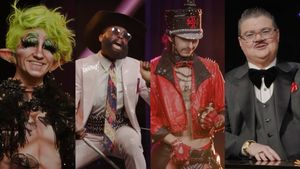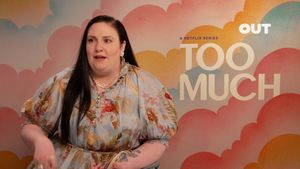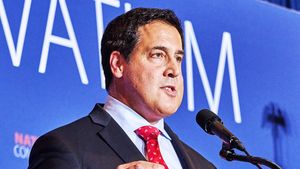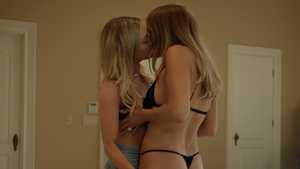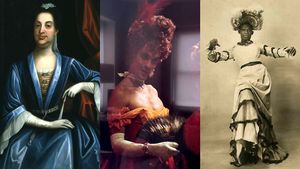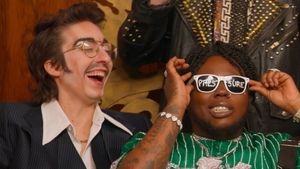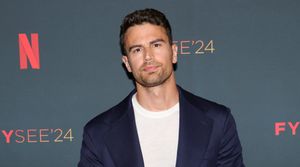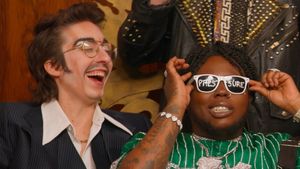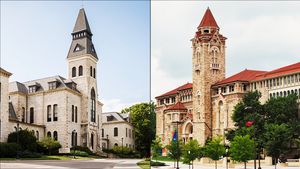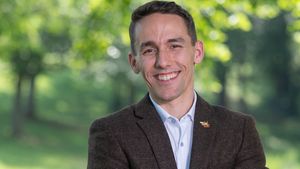When the British dystopian series Black Mirror dropped on Netflix this October, there was a palpable buzz among queer women, who fell headlong for the episode titled “San Junipero.” Its literally timeless love story between stars Mackenzie Davis and Gugu Mbatha-Raw delivered the kind of lasting love between women that’s sorely lacking on much of television, and audiences ate it up.
That episode, in which Davis’s adorable nerd Yorkie and Mbatha-Raw's wildly charming Kelly meet in the bewitching titular town sometime in the early ’80s may have placed Davis, 29, squarely on the collective radar of queer women, but it’s hardly her first pas de deux with another actress. The Canada native has stolen focus as the emo genius computer coder Cameron Howe, aside costar Kerry Bishé, on AMC’s under-discovered Halt and Catch Fire for three seasons now. If Davis hasn’t already caught your eye, including in her role in the Matt Damon crowd-pleaser The Martian, she’ll most certainly make waves in the highly anticipated Blade Runner 2049, from Arrival director Denis Villeneuve.
But most recently, Davis and Caitlyn Fitzgerald (Masters of Sex) parried and thrusted as friends and competing actresses on a weekend away to Big Sur in the dark psychological thriller Always Shine. The film, from director Sophia Takal, was released in theaters earlier this month and is currently available on VOD.
The first time we see Davis’s Anna in Takal’s deeply affecting character study, she argues with a car mechanic who’s charged her for work she didn’t agree to, and the sense that she’s been taken advantage of based on her gender is pervasive. The scene is juxtaposed with the first glimpse of Fitzgerald’s Beth sobbing and emoting her way through an audition; we later learn the role requires her to perform several nude scenes. While Beth is literally acting in her first scene of the film, Anna also performs in her role as female while haggling with the mechanic.
“While I think that it isn’t gender-exclusive, I do think there are more specific demands on women to perform in certain ways. And we’re told the way we're supposed to perform our entire lives,” Davis told PRIDE in a phone interview. “I mean, women are used to sell products, so we have a lot of information about what’s desirable being hammered into us since infancy. I think that’s a beautifully written opening to the movie to see these two modes of performance.”
Davis and Fitzgerald may have been at deeply emotional, occasionally violent odds on-screen for much of Always Shine, but shooting the film with Takal and the crew was one of the most healing experiences she’s had on set, Davis said.
“I felt like I got to go to feminist summer camp or something. We all got to live in the woods and lay bare our frustrations and share our own tales. It was a really lovely experience,” she said about the immersive, intimate experience Takal created in which she and her husband (writer, producer, and costar Lawrence Michael Levine), Davis, Fitzgerald and a few members of the crew lived together in a house in Big Sur for several weeks.
“It was the most intimate experience I’ve had making a movie. And so much of what appealed to me about making it was the small scale and the intensity in which Sophia wanted us to immerse ourselves in the world of the movie — but not in like an unrelenting, method way,” Davis elaborated.
Davis counted eight people, including the director of photography and Takal’s sister, who catered their meals, who shared that rented house during Always Shine’s shoot. They began their days warming up, then shot the intense thriller, and capped each day it off with meals and a communal living situation.
“It was weirdly the healthiest way I’d ever made a movie because it was isolated between these bookends of the day,” Davis said. “You didn’t have this really shitty, horrible explosion of emotions all day and then drag yourself into your hotel room and isolate yourself until the next day.”
After three seasons of portraying Cameron on the addicting Halt and Catch Fire, about the tech race in the ’80s that began with engineering the PC, Davis is no stranger to an explosion of emotion on-screen. Davis, Bishé, Lee Pace, and Scoot McNairy form one of the most fascinating quartets currently on television, alternately celebrating and sparring in various ever-watchable combinations. But late in the series’ first season, Davis’s Cam and Bishé’s business-savvy wife and mom Donna Clark formed an irresistible, unexpected partnership that is arguably the show’s core relationship.
“It was a slow-boiling surprise to us the way that the show sort of shifted,” Davis said. It’s been such a joy and an unbelievable experience to get to do it with Kerry. I think she’s the best actress I’ve ever worked with.”
The shift in the story from one that focused primarily on Cam’s working and personal relationship with Pace’s Joe MacMillan and Donna’s role as a working mom with career aspirations married to McNairy’s Gordon Clark to one of pioneering women navigating the male-dominated tech world offered a welcome twist for Davis at the time.
"In the first season of Halt, there was a lot of fighting. Not between the actors, but between the characters, and it hurt a little after a while,” Davis explained. “We were always betraying each other and there was always something nasty going on, which I think makes for very interesting drama but can be a bit tiring on our side of it.”
For viewers caught up on Halt and Catch Fire, and this isn’t much of a spoiler in the world of TV drama, Cam and Donna left off season 3 at odds, to say the least. Still, the close work with Bishé and the forging of that on-screen relationship has resonated for Davis.
“It feels like a genuinely loving, intense, difficult, real relationship that is grounded in love and respect and is difficult in that way but has all the tones or a real relationship,” Davis said. “It was lovely to go through that with her. It’s been a very meaningful and fulfilling aspect of my female relationships.”
Davis was well into her run on Halt and Catch Fire when she got the call to appear in an episode of Black Mirror, a show she’s admittedly obsessed with, adding that she had no idea its team even looked at American or Canadian actors.
“I was blown away already when they said they were interested in me for a part. And then I read the script, and obviously, it was different from any other Black Mirror I’d read, and so just emotionally resonant,” Davis said.
By the time Black Mirror aired in the United States this fall Davis had already caught the eye of many queer women, due in large part to her close work with Bishé and Cameron’s cool ennui and enviably androgynous ’80s wardrobe. While Davis knew the script from writer Charlie Brooker portrayed a beautiful love story, she said she hadn’t been aware of how Yorkie and Kelly’s story would resonate with women in the LGBT community.
“[The script] just treats it as a love story, and that is the form of connection in the story. I’ve been thinking about it, and this is a weird connection to make, but in the way that Halt shifted and became about female entrepreneurs. The creators never made a meal or a point out of telling us what they were doing with plotting their forward thinking for treating women as, you know, inherently interesting people in the same way that men get treated,” Davis said, adding that “the reception educated us about how rare that was.”
Since the CW’s post-apocalyptic series The 100 very ceremoniously killed off Lexa, the lesbian love interest of the show’s female bisexual lead character Clarke last spring, the “dead lesbian/kill your gays” trope has been assailed by LGBT media and fans alike. The premise of “San Junipero,” where “Heaven Is a Place on Earth,” flies in the face of that trope, offering quite the opposite — everlasting love and life. And Davis said she’s grateful not only for the response to the episode but also for what she learned.
“I read a bunch about the way people were reacting to it, and it was so cool,” she said. “I felt I got invited into a world that I hadn’t really accessed before. I didn’t know about some of the frustrations the queer community had about constantly killing the single female gay character on television — the sort of implicit punishment for being gay that got woven into every storyline. The response to the show and the response to this episode as some sort of a release from that trope is so fucking cool to read about.”
Davis’s career has been marked by a few common threads, such as working closely with other women in progressive roles and becoming a go-to actress of ’80s nostalgia in Halt and Catch Fire and “San Junipero,” both of which boast killer vintage soundtracks. While Davis said she’s not privy to the music in Halt as it’s done in post-production, she got to experience some of the music in Black Mirror while shooting.
“On Black Mirror we did get to hear the music — at least anything in the bar scene. ‘C’est La Vie’ [by Robbie Nevil] was in my head for weeks," she said. "Where I would just be walking and be like, ‘c’est la vie!’”
And the title of that song, or “that’s life” as it translates, seems appropriate for the respected young actress who’s surely on the precipice of major stardom with Blade Runner 2049. If “San Junipero” taught us anything, it’s that it’s a short leap from the ’80s to the future.







